2020年(北京)中考英语高分策略-专题3-阅读短文回答问题304 亲情+风俗+历史
2020年北京中考英语试题(解析版)
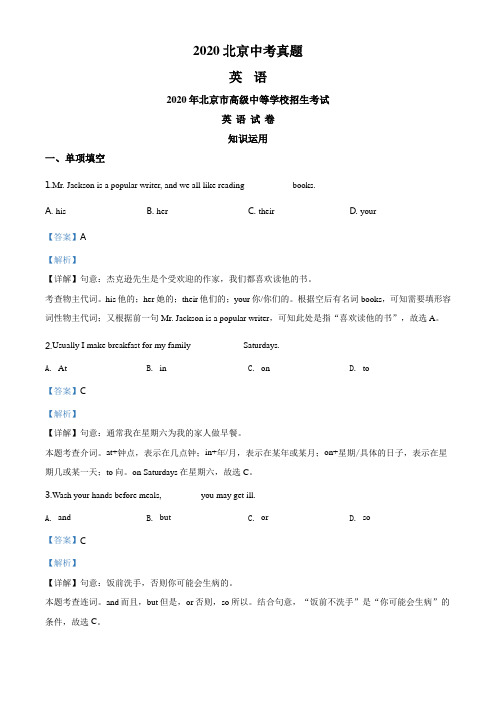
【答案】C
【解析】
【详解】——句意:你知道视频会议什么时候开始吗?——明天上午九点。
考查宾语从句。问句是一个含宾语从句的复合句,宾语从句中从句语序应该为陈述句语序,因此排除B和D;根据答语“At 9 o'clock tomorrow morning.”可知询问的应该是将来的事,用一般将来时,选项A是一般过去时,故选C。
8.I ___________ on the computer when Frank called me last night.
A.workB.will workC.was workingD.am working
【答案】C
【解析】
【详解】句意:弗兰克昨晚打电话给我时,我正在用电脑工作。
考查过去进行时。work工作,动词原形;will work一般将来时;was working过去进行时;am working现在进行时。根据题干中“when Frank called me last night”可知此处表示当某件事情发生的时候,另一件事情正在进行,when引导的从句用一般过去时,主句用过去进行时。故选C。
ually I make breakfast for my family ___________ Saturdays.
A.AtB.inC.onD.to
【答案】C
【解析】
【详解】句意:通常我在星期六为我的家人做早餐。
本题考查介词。at+钟点,表示在几点钟;in+年/月,表示在某年或某月;on+星期/具体的日子,表示在星期几或某一天;to向。on Saturdays在星期六,故选C。
12.— Do you know ____________?
2020年(北京)中考英语高分策略-专题3-阅读短文回答问题3

下午茶+语言学习+主题公园A[2019·丰台一模]Afternoon TeaThe warm weather may look perfect for outdoor exercise. But for those who are not thatsporty, what could be nicer than having a relaxing afternoon tea with a few good friendsand taking a break from studying?The concept (概念) of “afternoon tea” first appeared in the U.K. in the mid-19th century. Itwas introduced in England by Anna Maria Russell, the seventh Duchess of Bedford. The evening meal in her household was normally served fashionably late at 8 p.m., but she felt hungry at 4 p.m.every day, so she started asking for a tea tray with butter, bread and cakes at that time. Several days later, she found her new habit difficult to break and soon invited her friends to join her. This pause (间歇) for tea quickly became a fashionable social event. During the 1880s, upper class and society ladies would even change into long dresses, gloves and hats for their afternoon tea.Traditional afternoon tea is a small meal which is normally served from 4 p.m.to 6 p.m.once a day. It uses a three-tiered serving tray. The trays carry a variety of foods, such as finger sandwiches, freshly baked scones with cream and fruit jam, cakes and pastries. Of course, tea or coffee, served with milk and sugar, is also provided.Traditional afternoon tea is a dainty (讲究的) meal. Therefore, the order of enjoying the food is from the bottom to the top and from salty to sweet. Sandwiches are eaten first, followed by scones, then the sweet snacks like cakes and pastries. When drinking the tea, people taste slowly rather than “glugging” it down. It’s also a social activity. As you can see the scene in the TV play—“Downton Abbey”, ladies wear pretty clothing, men are dressed neatly and the waiters are well trained and polite.Nowadays, you can enjoy a traditional fancy afternoon tea in many restaurants and hotels. It is also enjoyed to celebrate a special event such as a birthday, a pre-wedding or a baby shower party with a group of friends. So far, afternoon tea activities have become far beyond friends getting together and eating. It has been a part of the traditional culture as well as a fashion for British.1.Who introduced “afternoon tea” in England?2.What did the upper class ladies wear during the 1880s?3.When is traditional afternoon tea served?4.What is the fourth paragraph mainly about?5.Why is afternoon tea popular for British all the time?B[2019·朝阳一模]You can study the English language for years but still not understand a native(本地的) speaker of English when you meet one. Native speakers say a lot of things, but you can’t find them in any dictionary. Well, don’t worry. Here’s a secret: a lot of British people can’t understand each other either!There are different local accents(口音) across the UK, and a number of areas have several different accents. That is, they have their own vocabulary and expressions. There were at least six different accents born to London the last time I counted.Worse than that, it is not just where a person is born in the UK that decides his accent. For example, a language and its accents often change across class or level of education. Another example is how languages can differ among age groups in the UK. The words and pronunciation used by young people in the UK can be completely different compared with those used by adults. They are creating a “yoof culture”.The word “yoof” is a slang(俚语) spelling of “youth”. Some people don’t consider “yoof” to be a positive(积极的) term since its pronunciation is easier and lazier than “youth”. Other people see the term as positive, because it describes how young people are creating their own language, idea and culture.When parents find it difficult to understand their children, the children can say more things without the examining of their parents. In this way, young people are starting to find freedom, independence and self-expression. Even though certain groups of society worry about “yoof culture”, new words keep appearing in our daily life.So learners should have no fear about communicating with native speakers. Even British people don’t speak English properly! The UK no longer owns the English language.1.What’s the secret according to the passage?2.Are there different accents across the UK?3.Who are creating a “yoof culture”?4.What’s the fourth paragraph mainly about?5.What’s the writer’s advice for learners when they communicate with native speakers?C[2019·西城二模]330 million nature lovers from all over the world visited US national parks in 2018. This summer, visitors will have a new park to explore. Indiana Dunes National Park started on February 15, 2019. Just 50 miles from Chicago, the park is doable as a day trip or a multi-day adventure.Located(位于) in northwestern Indiana along the shore of Lake Michigan, Indiana Dunes is the first national park in this state. The park is already Indiana’s most-visited site, with about 3.5 million visitors each year. Here’s what to know before you visit.The park’s most impressive features(特点) are its towering sand dunes. Formed by glacial melt(冰川融化), the park’s namesake dunes can reach heights of almost 200 feet. Strong winds blowing off Michigan continually shape and change the park’s 15 miles of shoreline, ensuring a slightly different experience each time you visit.The warm months are the best time to take full advantage of the park’s beach. But the park is worth visiting in any season. You can do different activities in different seasons. To see beautiful fallen leaves, plan your visit inautumn. Or explore the park in winter and enjoy far fewer crowds. If you visit in spring, just enjoy your walk for beautiful flowers.A 3.5-mile path showing the best the park has is to offer. The most famous dune is Mount Baldy, and on certain days you can actually climb to the top of this sand dune to enjoy open views of the surrounding landscape(风景). Other outdoor activities at Indiana Dunes National Park include biking, boating, and fishing. Of course, swimming in Lake Michigan is one of the most beloved activities, but it’s important to be mindful of changing water conditions. Like an ocean, Lake Michigan can be calm one minute and dangerous the next.The park’s Dunewood Campground has 66 campsites and is equipped with restrooms and showers. It is first-come, first-served, and the fee is $25 per night. If you don’t want to camp, several other accommodations(住宿) around Indiana Dunes don’t require sleeping in a tent. Everything from beds and breakfasts to hotels is available.If you’re flying to the Midwest, the airports nearest to Indiana Dunes are South Bend International in South Bend, about 45 miles away, and both Midway and O’Hare in Chicago. From Indianapolis, the drive is about 2.5 hours. The park’s main gate is just off Ⅰ-94 and is easily accessed from the Indiana Toll Road. Take the exit for IN-49 and you will pass right by the visitor center where you can park, head in to get a map, and plan the day. The park fee is just $6 per car and $80 for a season pass.1.When did Indiana Dunes National Park start?2.Where is the park located?3.Why is the park worth visiting in any season?4.What can you do on the top of Mount Baldy?5.What is the purpose of writing the passage?【参考答案】A1.Anna Maria Russell.2.They wore long dresses, gloves and hats.3.From 4 p.m. to 6 p.m.4.Traditional afternoon tea is a dainty meal.5.Because it’s a part of the traditional culture and a fashion.B1.A lot of British people can’t understand each other either.2.Yes./Yes, there are.3.Young people in the UK.4.Different opinions about the word “yoof”.5.They should have no fear.C1.On February 15, 2019.2.In northwestern Indiana along the shore of Lake Michigan.3.Because you can do different activities in different seasons.4.Enjoy open views of the surrounding landscape.5.To help plan a trip to Indiana Dunes National Park.。
(北京专版)2020中考英语复习方案第三篇提分题型专练回答问题04亲情故事打喷嚏风俗词典历史试题
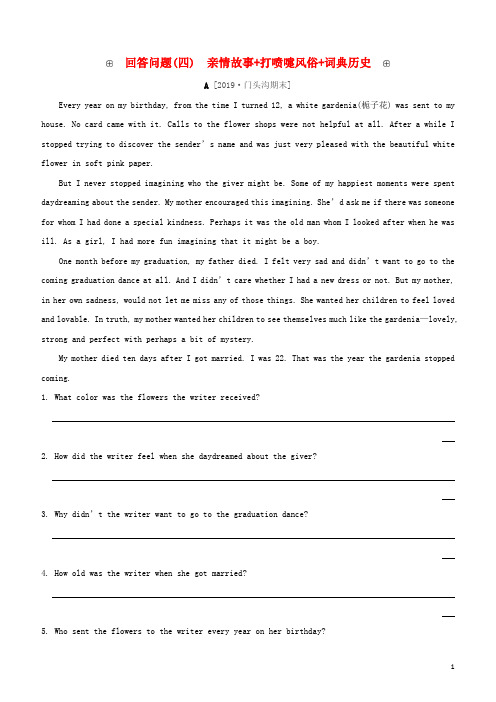
回答问题(四) 亲情故事+打喷嚏风俗+词典历史A[2019·门头沟期末]Every year on my birthday, from the time I turned 12, a white gardenia(栀子花) was sent to my house. No card came with it. Calls to the flower shops were not helpful at all. After a while I stopped trying to discover the sender’s name and was just very plea sed with the beautiful white flower in soft pink paper.But I never stopped imagining who the giver might be. Some of my happiest moments were spent daydreaming about the sender. My mother encouraged this imagining. She’d ask me if there was someone for whom I had done a special kindness. Perhaps it was the old man whom I looked after when he was ill. As a girl, I had more fun imagining that it might be a boy.One month before my graduation, my father died. I felt very sad and didn’t want to go to the c oming graduation dance at all. And I didn’t care whether I had a new dress or not. But my mother, in her own sadness, would not let me miss any of those things. She wanted her children to feel loved and lovable. In truth, my mother wanted her children to see themselves much like the gardenia—lovely, strong and perfect with perhaps a bit of mystery.My mother died ten days after I got married. I was 22. That was the year the gardenia stopped coming.1. What color was the flowers the writer received?2. How did the writer feel when she daydreamed about the giver?3. Why d idn’t the writer want to go to the graduation dance?4. How old was the writer when she got married?5. Who sent the flowers to the writer every year on her birthday?B[2019·怀柔一模]Superstition about SneezingIt’s a Western custom to say “bless you” after someone sneezes.“Achoo!”“Bless you.”This is a common exchange in English-speaking countries. When you hear someoneelse sneeze, it is polite to say “bless you”, to which they should reply with “thank you”. But where does this odd custom come from?In fact, it dates back to medieval(中世纪的) Europe, specifically, the time of the bubonic plague(黑死病). The plague killed nearly one-third of Europe’s population within three years (1347—1350). The first symptom of the bubonic plague was sneezing. At that time, people believed that if you sneezed, your soul might leave your body.People didn’t know how to cure the bubonic plague. They were simply encouraged to say “God bless you” and do other superstitious(迷信的) things, hoping the soul would go back into the body. And over time, “God bless you” was shortened to “bless you”.Of course, in modern times, we know that sneezing has nothing to do with the soul or any other superstitious thing. But just like so many other customs from the past, saying “bless you” has stayed with us for hundreds of years.But you may be wondering—what if someone sneezes more than once? Well, you don’t have to keep saying “bless you”. In fact, if someone sneezes more than twice, or sneezes especially loudly, you may want to ask them if they’re OK, or if they would like a tissue(纸巾).Then again, you don’t really need to say anything at all. People won’t think you’re rude if you forget to say “bless you”. But they will also appreciate it if you do.1.Where does the odd custom “bless you” come from?2.What was the first symptom of the bubonic plague?3.Did people know how to cure the bubonic plague in the past?4.How long has “bless you” stayed with us?5.What should you do if someone sneezes more than twice?C[2019·石景山二模]English dictionaries which were written before 18th century had only words which were not common, or words which were difficult to spell. Then, in 1755, Dr. Samuel Johnson, a great English writer, wrote a famous dictionary. This dictionary contained common words as well as unusual ones. It also showed how words should be used in sentences.In 1858, a group of people who study language started to write The Oxford English Dictionary (OED). They wanted to list all the words of the English language. They even included words which were not used any more. They also wrote sentences that show the meanings of words. They also described the history of words, saying when words were first used in English, and which languages they came from. The OED tells us, for example, that “algebra” comes from Arabic and was first used in English in the 16th century. The dictionary took hundreds of people over seventy years to complete. It has been improved many times, as the number of words used in English has increased. The more recent dictionary gives the meanings of over one million words. It is put into twenty-one books: each one is over one thousand pages long.Although Americans speak English, they use some words that are not used in British English, for example, the season an English person calls “autumn”, is called “fall” by an American. The first dictionary of American English was published by Noah Webster in 1828. He also decided to spell some words in a simpler way. For example, he wrote “colour” as “color”, “centre” as “center”, and “plough” as “plow”. These spellings are still used in America today. Since 1828, Webster’s Dictionary of American English has been improved and made bigger many times.A good dictionary is a very important tool for every reader. Many modern English dictionaries are now available. They give different kinds of information. It is very important to choose thebest dictionary for your needs and to use it often.1.Who was Dr. Samuel Johnson?2.When did people begin to write the OED?3.How long did the OED take to complete?4.Which word is American English, “plough” or “plow”?5.How is American English different from British English?【参考答案】A1. White.2. She was happy.3. Because her father died.4. 22.5. Her mother.B1.(Medieval) Europe./The time of the bubonic plague.2.Sneezing.3.No./No, they didn’t.4.For hundreds of years.5.We can ask them if they’re OK, or if they would like a tissue.C1.A great English writer.2.In 1858.3.Over seventy years.4.Plow.5.Americans use some words that are not used in British English and spell some words in a simpler way.。
北京专版2020中考英语复习方案第四篇高分许速测03完形填空+阅读理解C+回答问题试题

小卷速测<三> 完形填空+阅读理解C+回答问题<限时:20分钟>Ⅰ. 完形填空Father in NeedI quietly placed my ear against the kitchen door. Mom had a male 1 ! I peeked<从缝隙偷看> around. Sitting there was a gentleman, the most handsome man I’d ever seen.Mom was a young widow<寡妇> then with three children. My sister was ten, my brother four and I six. I 2 having a daddy. And I knew he was the one. Then I marched right into the kitchen."Hi! I’m Patty. What’s your name?""George."3 towards Mom, I asked, "Don’t you think my mom’s pretty?""Patty!" Mom scolded<责备> with embarrassment. "Go and check on Benny."George leaned forward and whispered, "Yes, I do. I’ll see you later, Patty. I think we’ll be good friends."George started 4 on Mom more often. He always seemed happy to see me and never grew tired of my endless questions.Soon they entered into a marriage. But one evening was especially bad. Benny was crying on the kitchen floor. Annie was complained 5 it wasn’t her place to look after that spoiled child. And I spilled<使溢出> a whole pot of butter milk. With an empty look, George muttered, "I must have been 6 to marry a woman with three kids."Mom flew to their bedroom in tears,and George walked out. I hurried to the porch<门廊>. "I’m sorry. I’ll be more careful next time. Please don’t 7 !"Gently wiping my tears, he said, "We’re friends, and friends never abandon<抛弃,遗弃> the people they love." Then he went to comfort Mom.Over the years, George has always been there for me, through many ups and downs. I still turn to him with my 8 though he’s already 85.< >1.A.volunteer B.supporter C.challenger D.visitor< >2.A.kept B.missed C.spent D.minded< >3.A.Looking B.Checking C.Turning D.Speaking< >4.A.working B.calling C.taking D.living< >5.A.loudly B.quietly C.carefully D.gently< >6.A.talented B.brave C.mad D.excited< >ugh B.worry C.relax D.leave< >8.A.suggestions B.experiences C.problems D.achievementsⅡ. 阅读理解The world itself is becoming much smaller by using modern traffic and modern communication means<通讯设备>. Life today is much easier than it was hundreds of years ago, but it has brought new problems. One of the biggest is pollution. To pollute means to make things dirty. Pollution comes in many ways. We see it, smell it, drink it and even hear it.Man has been polluting the earth. The more people, the more pollution. Many years ago, the problem was not so serious because there were not so many people. When the land was used up or the river was dirty in one place, man moved to another place. But this is no longer true. Man is now slowly polluting the whole world.Air pollution is still the most serious. It’s bad for all living thing s in the world, but it is not the only one kind of pollution. Water pollution kills our fish and pollutes our drinking water. Noise pollution makes us angry more easily.Many countries are making rules to fight pollution. They stop people from burning coal in houses and factories from sending dirty smoke into the air.Pollution by SO2is now the most dangerous kind of air pollution. It is caused by heavy traffic. It is sure that if there are fewer people driving, there will be less air pollution.The earth is our home. We must take care of it. That means keeping the land, water and air clean. And we must take care of the rise in pollution at the same time.9.Hundreds of years ago, life was it is today.< >A.as hard asB.as easy asC.much easier thanD.much harder than10.Pollution comes in many ways. We can even hear it. Here "it" means . < >A.water pollutionB.air pollutionC.noise pollutionD.rubbish11.Which of the following is NOT true? < >A.Many countries are making rules to fight pollution.C.If people could go to work by bus, it would help to fight against the problem of SO2.D.The pollution is not so serious because there are not so many people living on the earth. Ⅲ. 回答问题Mechanical EngineeringDo you like to build with blocks? Have you ever wondered how planes stay in the air? Do you like to design and create new things? If you do, a career<职业>in mechanical engineering might be right for you!A mechanical engineer is responsible for coming up with and designing mechanical systems. Mechanical systems can include machine design, heating and cooling equipment, and product design.Mechanical engineers are in high need right now. There are a lot of job openings for mechanical engineers, but there aren’t enough people to fill those jobs. Because there is a high need for engineers and the work requires specialized knowledge, engineers get paid more than some other careers.To be a mechanical engineer, you need to graduate from college with a bachelor’s<学士> degree. In college, you will learn problem-solving and critical thinking skills.Problem-solving is very important in the field of mechanical engineering.To come up with the best solution to a problem, mechanical engineers need to think in different ways. They also need to be creative, because they may need to make something that’s never been made before. Paying attention to details<细节> is important as well. Many designs depend on a lot of little details.Mechanical engineers also need to be able to use different tools, such as calculators, high-speed cameras, and computers. There are many computer programs mechanical engineers use to create designs, run scenarios<方案>, and do research.As with many other jobs, mechanical engineers should be able to meet deadlines<期限> and work well with other people. Some jobs can be done with just one person, but more often mechanical engineers work on a team to complete a project. If an engineer cannot manage his or her time well and misses a deadline, the whole team gets delayed<拖延>.Some engineers work in an office, and some travel to different worksites while a machine or product is being built, so they can help solve any problem.Mechanical engineering takes a lot of thought. It is a great career for people who like to make objects and machines work, solve problems, and be creative!13.To be a mechanical engineer, what will a student learn in college?14.How can mechanical engineers come up with the best solution to a problem?15.Why should a mechanical engineer be able to meet deadlines?16.Where do mechanical engineers work?[参考答案]Ⅰ.[主旨大意] 本文是一篇记叙文,讲述了作者与继父之间的故事。
2020-2024年北京中考英语阅读理解难题汇编
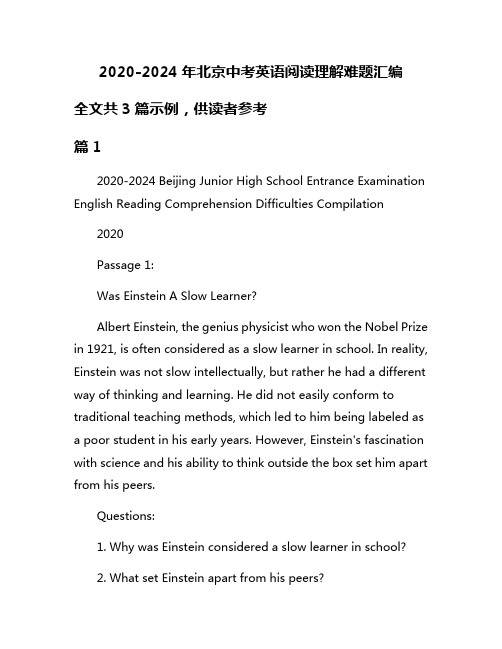
2020-2024年北京中考英语阅读理解难题汇编全文共3篇示例,供读者参考篇12020-2024 Beijing Junior High School Entrance Examination English Reading Comprehension Difficulties Compilation2020Passage 1:Was Einstein A Slow Learner?Albert Einstein, the genius physicist who won the Nobel Prize in 1921, is often considered as a slow learner in school. In reality, Einstein was not slow intellectually, but rather he had a different way of thinking and learning. He did not easily conform to traditional teaching methods, which led to him being labeled as a poor student in his early years. However, Einstein's fascination with science and his ability to think outside the box set him apart from his peers.Questions:1. Why was Einstein considered a slow learner in school?2. What set Einstein apart from his peers?3. How did Einstein's way of thinking benefit him in his later life?Passage 2:The Benefits of BilingualismResearch has shown that being bilingual has many cognitive benefits. Bilingual individuals have been found to have better problem-solving skills, improved multitasking abilities, and greater creativity. In addition, bilingualism has been shown to delay the onset of Alzheimer's disease in the elderly. Therefore, learning a second language not only enhances communication skills but also has positive effects on brain function.Questions:1. What cognitive benefits have been associated with being bilingual?2. How does bilingualism benefit the elderly?3. What positive effects does learning a second language have on brain function?2021Passage 3:The Impact of Social Media on TeenagersSocial media has become an integral part of teenagers' lives, with many spending hours each day on platforms such as Instagram and Snapchat. While social media allows for instant communication and connection with others, it also has negative effects on teenagers' mental health. Studies have found that excessive social media use is linked to increased feelings of loneliness, depression, and anxiety among teenagers. Therefore, it is important for parents to monitor their children's social media usage and encourage them to engage in offline activities as well.Questions:1. What are the positive aspects of social media for teenagers?2. What negative effects can excessive social media use have on teenagers' mental health?3. How can parents help teenagers mitigate the negative effects of social media?Passage 4:The Importance of Environmental ConservationEnvironmental conservation is crucial for the preservation of biodiversity and the health of our planet. Human activities such as deforestation, pollution, and overfishing have led to the loss of many species and habitats. It is essential for individuals and governments to take action to protect the environment and reduce their carbon footprint. By making small changes in our daily lives, such as recycling, using public transportation, and conserving water, we can all contribute to a more sustainable future.Questions:1. Why is environmental conservation important?2. What human activities have led to the loss of species and habitats?3. How can individuals contribute to environmental conservation in their daily lives?2022Passage 5:The Power of Positive ThinkingPositive thinking has been linked to numerous health benefits, including reduced stress levels, improved mentalwell-being, and increased resilience. By adopting a positive mindset, individuals can better cope with challenges and setbacks, leading to a happier and more fulfilling life. Research has shown that positive thinking can even improve physical health by boosting the immune system and reducing the risk of chronic diseases. Therefore, cultivating a positive outlook on life is essential for overall well-being.Questions:1. What health benefits have been associated with positive thinking?2. How can positive thinking help individuals cope with challenges?3. Why is cultivating a positive outlook on life important for overall well-being?Passage 6:The Rise of Electric VehiclesAs the world grapples with the effects of climate change, the adoption of electric vehicles has become increasingly important. Electric vehicles produce fewer greenhouse gas emissions than traditional cars, making them a more environmentally friendly option. In addition, advances in technology have led toimprovements in the range and charging times of electric vehicles, making them a practical choice for consumers. By transitioning to electric vehicles, we can reduce our reliance on fossil fuels and help combat climate change.Questions:1. Why have electric vehicles become increasingly important in the fight against climate change?2. What environmental benefits do electric vehicles offer?3. How have advances in technology improved the practicality of electric vehicles?2023Passage 7:The Impact of Artificial Intelligence on SocietyArtificial intelligence (AI) has the potential to revolutionize many aspects of society, from healthcare to transportation. While AI has the ability to streamline processes and improve efficiency, it also raises ethical concerns about privacy and job displacement. As AI technology continues to advance, it is crucial for policymakers to create regulations that protect individuals' rights while harnessing the benefits of AI for societal progress.Questions:1. How can artificial intelligence revolutionize different sectors of society?2. What ethical concerns are associated with the use of artificial intelligence?3. What measures can policymakers take to ensure the responsible use of AI technology?Passage 8:The Importance of Cultural DiversityCultural diversity enriches societies by promoting understanding, respect, and tolerance among different groups of people. Embracing cultural differences allows individuals to learn about new perspectives and traditions, fostering a more inclusive and harmonious community. By celebrating diversity and promoting intercultural exchange, we can create a more vibrant and cohesive society that values the contributions of all its members.Questions:1. How does cultural diversity promote understanding and respect among different groups?2. What benefits does embracing cultural differences bring to communities?3. How can individuals contribute to promoting cultural diversity in their communities?2024Passage 9:The Rise of E-CommerceE-commerce has transformed the way we shop, allowing consumers to browse and purchase goods online from the comfort of their homes. With the convenience of one-click ordering and fast delivery options, online shopping has become increasingly popular among consumers. However, the rise ofe-commerce has also led to concerns about data privacy and the impact on brick-and-mortar stores. As e-commerce continues to grow, it is important for businesses to adapt to the changing landscape and prioritize customer security and satisfaction.Questions:1. How has e-commerce changed the way consumers shop?2. What concerns have arisen with the rise of e-commerce?3. What steps can businesses take to address these concerns and ensure customer satisfaction?Passage 10:The Future of WorkWith advancements in technology and automation, the future of work is rapidly evolving. Jobs that once required manual labor are being replaced by machines, leading to concerns about job displacement and income inequality. However, new opportunities are also emerging in fields such as robotics, artificial intelligence, and green energy. As we navigate these changes, it is essential for individuals to adapt to new skills and industries to remain competitive in the workforce of the future.Questions:1. How is technology changing the future of work?2. What challenges do advancements in automation present for society?3. How can individuals prepare for the changing landscape of the workforce?Overall, the Beijing Junior High School Entrance Examination English Reading Comprehension section for the years 2020-2024 features a diverse range of topics that challenge students' critical thinking skills and ability to comprehend complex texts. By mastering the skills required to tackle these difficult questions, students can improve their overall English proficiency and perform well on the exam.篇22020-2024 Beijing Junior High School Entrance Examination English Reading ComprehensionIn recent years, the English reading comprehension section of the Beijing Junior High School Entrance Examination has become increasingly challenging. Students are required to demonstrate a high level of proficiency in reading and understanding a variety of texts, including fiction, non-fiction, and poetry. In order to succeed in this section of the exam, students must be able to analyze texts, draw inferences, and make connections between different pieces of information.One common type of question that students may encounter in the English reading comprehension section is the inference question. In these questions, students are asked to make aneducated guess about the author's intended meaning based on the information presented in the text. This requires students to carefully consider the wording of the text, as well as the context in which it is presented.Another challenging aspect of the reading comprehension section is the vocabulary question. In these questions, students are required to demonstrate their understanding of various terms and phrases used in the text. This may require students to use context clues to determine the meaning of unfamiliar words, or to identify synonyms or antonyms for given terms.Additionally, students may be asked to make connections between different pieces of information presented in the text. This may involve identifying cause and effect relationships, drawing conclusions based on evidence provided in the text, or comparing and contrasting different ideas or perspectives.Overall, the English reading comprehension section of the Beijing Junior High School Entrance Examination requires students to demonstrate a high level of critical thinking and analytical skills. By practicing with a variety of texts and question types, students can improve their reading comprehension abilities and increase their chances of success on the exam.篇3Title: Compilation of Difficult Reading Comprehension Questions for the Beijing Junior High School Entrance Examination from 2020 to 2024Introduction:The Beijing Junior High School Entrance Examination is a highly competitive and challenging assessment for middle school students in Beijing. The English section of the exam often includes reading comprehension questions that test students' ability to understand and analyze written texts. In this document, we have compiled a series of difficult reading comprehension questions that have appeared in the exam from 2020 to 2024. These questions cover a range of topics and require students to demonstrate advanced reading and critical thinking skills.Question 1:Read the following passage and answer the questions below:"In recent years, there has been a growing concern about the impact of climate change on the environment. Rising temperatures, extreme weather events, and melting ice caps are all signs that our planet is facing a crisis. It is crucial that we takeaction now to reduce our carbon footprint and protect our planet for future generations."1. What is the main topic of the passage?A) The importance of recycling plasticB) The impact of climate change on the environmentC) The benefits of using renewable energy sourcesD) The history of environmental conservation efforts2. According to the passage, why is it important to take action to address climate change?A) To increase profits for companiesB) To protect our planet for future generationsC) To win awards for environmental initiativesD) To attract more tourists to environmentally friendly destinationsQuestion 2:Read the following passage and answer the questions below:"Many people believe that success in life is determined by a combination of talent and hard work. While talent may give youa head start, it is perseverance and determination that ultimately lead to success. It is important to set goals, work hard, and never give up, even in the face of obstacles."3. According to the passage, what is the key to success in life?A) Having natural talentB) Perseverance and determinationC) Setting unrealistic goalsD) Giving up at the first sign of failure4. What does the passage suggest about the role of talent in achieving success?A) Talent is the only factor that determines successB) Talent is more important than hard workC) Talent may give you a head start, but hard work is essentialD) Talent is not important at allConclusion:These sample questions provide a glimpse into the type of challenging reading comprehension questions that students mayencounter in the Beijing Junior High School Entrance Examination. By practicing with these questions and developing strong reading and critical thinking skills, students can better prepare themselves for success on the exam. It is important for students to read widely, think critically, and practice analyzing and synthesizing information from a variety of sources in order to excel in the reading comprehension portion of the exam. Good luck to all the students preparing for the Beijing Junior High School Entrance Examination!。
2020年(北京)中考英语高分策略-专题3-阅读短文回答问题303 励志+科技+比赛

励志+科技+比赛A[2020·怀柔期末]The meaning of life is what we choose it to be. To Jiang Bing, a man from Weinan, ShaanxiProvince, life just means living and helping others. Suffering(受苦)from ALS(渐冻症) for morethan 30 years, Jiang has never lost his love for life. What’s more, he has been teaching more than 200 children for free for over twenty years.At the age of 16, Jiang Bing fell to the ground on the way to school and was unable to stand up again. One doctor told him that he had a disease that was hard to cure(治愈)and suggested giving up searching for treatment. Surprisingly, Jiang had no fear or despair(绝望)at that time. He kept studying every morning and cherished(珍视) every moment, spending one day like it was a month.Though Jiang couldn’t enter a university himself because of the disease, he succeeded in teaching his younger sister and helping her get into a university in 1994. Not until then did the people living in the community realize that the special man could teach their children.So they asked him for help. The next year, Jiang started helping children with their studies. Apart from the school subjects, he also taught them art and clay sculpture(泥塑). He once taught 24 children in one single class, all for free.Today many of the children that he taught have graduated from university. Zhao Feiyu, a student who once received Jiang’s help, runs an art training school now. “He taught us wisely and carefully, and took no money,” he said. “He is my teacher and friend.”1. Where is Jiang Bing from?2. How long has Jiang Bing taught children for free?3. Who was the first person to enter a university with the help of Jiang Bing?4. What did Jiang Bing teach children apart from the school subjects?5. What can you learn from Jiang Bing’s story?B[2020·海淀一模]Maker MomentLast year, Izzy Goldstein, 12, learned in science class that we can reduceair pollution by using natural energy sources, such as wind and solar power,instead of gasoline. This made her wonder what she and her schoolmates coulddo to help the environment. “Maybe if my school got a bike rack(架子), more kids would bike toschool instead of depending on cars,” Izzy told TIME for Kids. Rather than ask their school to buy a rack, Izzy and her friends decided to make a bike rack by themselves.They came up with a design. They calculated how much wood they might need. They measured how long the boards should be. They used power tools to cut them and put them together safely. And they did all this in their school’s makerspace.Makerspaces are workspaces where kids can learn to create objects using technology, engineering, art and design. These spaces often feature a mix of high-tech machines, such as 3Dprinters and robotic kits(工具箱), and simple materials like clay and cardboard.Izzy goes to the Harley School in New York. It is one of a growing number of schools across the United States with makerspaces. Makerspaces are largely inspired by Maker Faires(创客盛会),which are events that give people a chance to share their creative projects. Each year, about 250,000 people attend the Maker Faires in San Mateo, California, and Queens, New York. Maker Faires have also spread to countries around the world, including Egypt, France and Thailand.Schools are introducing makerspaces to the curriculum(课程) because makerspaces give kids away to have ideas and build something from those ideas. Kima Enerson is a makerspace teacher at the Harley School. But she says kids can become extraordinary makers in an ordinary classroom, too. In Harley’s Lower School (pre-kindergarten to Grade 4), students learn about the basics of computer software. By the third grade, they study coding and how electricity works. In the sixth grade, they learn to safely use tools such as drills and saws. When students get to high school, Enerson shows them how to apply their skills to solve global problems. “Throughout the process of designing, students are learning to create something to better the world,” she says.1.What did Izzy and her friends decide to make by themselves?2.What are makerspaces?3.How many people attend the Maker Faires in San Mateo and Queens each year?4.Why are schools introducing makerspaces to the curriculum?5.What can high school students learn in Enerson’s class?C[2020·丰台二模]The Super BowlThe Super Bowl is the championship game of the National FootballLeague(联盟) in America every year. The champion of the National FootballConference (NFC) competes against the champion of the American Football Conference (AFC) to decide which is the best team in the country. Super Bowl is far more than a sporting event. The mixof America’s biggest institutions(体系):sports, TV, food consumption, advertising and entertainmentmakes the Super Bowl an American cultural phenomenon.The Super Bowl is usually held on the last Sunday of January or the first Sunday of February. That day is called Super Bowl Sunday. For years, it has been the most watched one-day sporting event in the US and it gradually has become an unofficial national holiday. Theaverage viewing rate of Super Bowl reached to 44.9 percent in 2019.Super Bowl Sunday sees more parties than any other day during the year. Young people are no exception to the party spirit. They gather to watch the game on TV. The Super Bowl is the third biggest eating day in America—behind Christmas and Thanksgiving. Fans host Super Bowl parties by filling their living rooms with junk food and drinks. Guests may arrive dressed in their team’s T-shirt and carrying beer to share.Knowing that the Super Bowl has the attention of millions of Americans, companies pay big money for game-time advertising. In 2019, the advertising cost set a record—$5.3 million for 30 seconds. The Super Bowl has developed to a TV selling season sandwiched between after-Christmas sales and Valentine’s Day.Another tradition of the Super Bowl is the Halftime Show, which presents at the halftime break between the second and third quarters. The Super Bowl Halftime Show is the most-watched musical event of the year. So it is also called the “Americans’ Spring Festival Gala”. Non-football fanstune(调台) into the Super Bowl for the most famous musicians’ performances during halftime. Asthe top performers, Maroon 5, Travis Scott and Big Boi gave impressive live show for the audience in the Super Bowl Halftime Show 2019. The show represents a link between American football and pop culture and helps broaden the television audience and nationwide interest.Americans view the Super Bowl as a National Day of revelry(狂欢). Although people maywatch it for different reasons, there is one thing for sure—they can find their own pleasure in it.1.What is the Super Bowl?2.When is the Super Bowl usually held?3.How do fans usually host Super Bowl parties?4.Why is the Halftime Show called the “Americans’ Spring Festival Gala”?5.What makes the Super Bowl more than just sport?【参考答案】A1. He is from Weinan, Shaanxi Province.2. Over twenty years.3. His younger sister.4. Art and clay sculpture.5. Never give up and help others.(符合题意即给分)B1.A bike rack.2.Makerspaces are workspaces where kids can learn to create objects using technology, engineering, art and design.3.About 250,000 people.4.Because makerspaces give kids a way to have ideas and build something from those ideas.5.They can learn to apply their skills to solve the global problems/create something to better the world.C1.It’s the championship game of the National Football League in America every year.2.On the last Sunday of January or the first Sunday of February.3.By filling their living rooms with junk food and drinks.4.Because it is the most-watched musical event of the year.5.The mix of America’s biggest institutions (:sports, TV, food consumption, advertising and entertainment make the Super Bowl more than just sports).。
2020年北京市中考英语
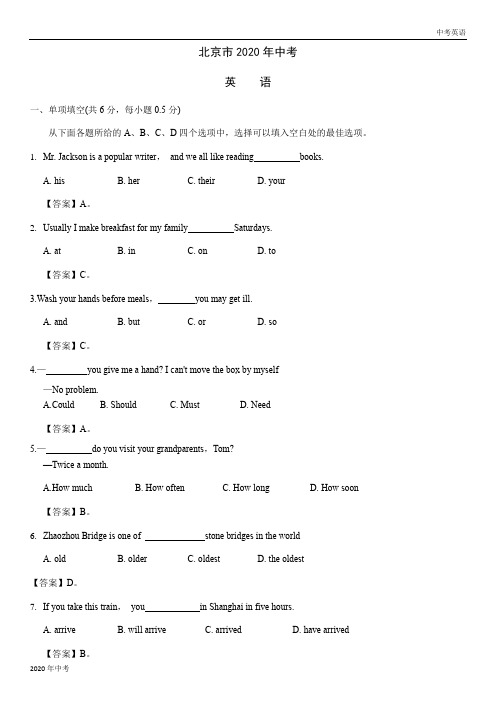
北京市2020年中考英语一、单项填空(共6分,每小题0.5分)从下面各题所给的A、B、C、D四个选项中,选择可以填入空白处的最佳选项。
1.Mr. Jackson is a popular writer,and we all like reading books.A. hisB. herC. theirD. your【答案】A。
ually I make breakfast for my family Saturdays.A. atB. inC. onD. to【答案】C。
3.Wash your hands before meals,you may get ill.A. andB. butC. orD. so【答案】C。
4.—you give me a hand? I can't move the box by myself—No problem.A.CouldB. ShouldC. MustD. Need【答案】A。
5.—do you visit your grandparents,Tom?—Twice a month.A.How muchB. How oftenC. How longD. How soon【答案】B。
6.Zhaozhou Bridge is one of stone bridges in the worldA. oldB. olderC. oldestD. the oldest【答案】D。
7.If you take this train,you in Shanghai in five hours.A. arriveB. will arriveC. arrivedD. have arrived【答案】B。
8.I on the computer when Frank called me last nightA. workB. will workC. was workingD. am working【答案】C。
中考英语高分策略-任务型阅读解题方法

The heaviest bicycle
A German cycling lover, Frank Dose, has recently made the world's heaviest bicycle with big old wheels and lots of other waste materials. He created it just because of a bet (打赌) he made with his friend. The bicycle weighed 1.08 tons. It broke the world record of its kind in weight. Frank said his bicycle was surprisingly easy to ride although it had a huge size and weighed a lot. He rode it in front of 5 000 people for over 100 meters to prove it.
( )F1.Frank built the world's heaviest bicycle with the materials that his friend bought for him. ( )2T.Some students in the community can get money from the bambike company to pay for their study. ( T)3.Bambikes are made of a special kind of bamboo and other materials. ( )4F.The two brothers rode their bikes in front of some people to show how to use them. ( F)5.30 twisted bicycles were made and sold out.
【真题】2020年北京市中考英语试卷含答案解析(Word版)
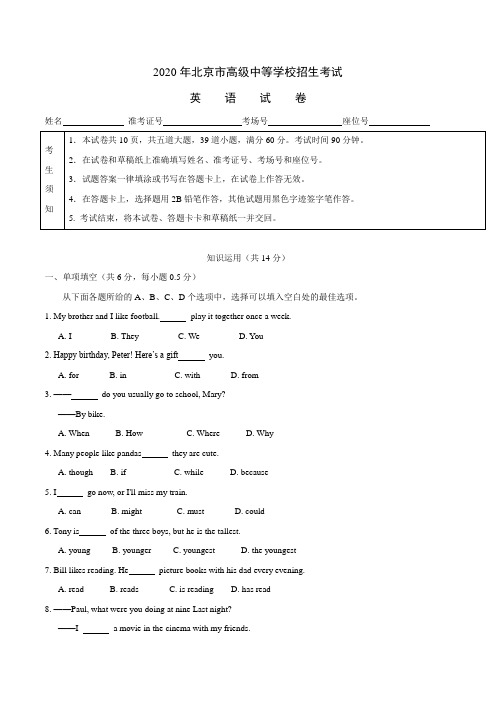
2020年北京市高级中等学校招生考试英语试卷姓名准考证号考场号座位号知识运用(共14分)一、单项填空(共6分,每小题0.5分)从下面各题所给的A、B、C、D个选项中,选择可以填入空白处的最佳选项。
1. My brother and I like football. play it together once a week.A. IB. TheyC. WeD. You2. Happy birthday, Peter! Here’s a gift you.A. forB. inC. withD. from3. ——do you usually go to school, Mary?——By bike.A. WhenB. HowC. WhereD. Why4. Many people like pandas they are cute.A. thoughB. ifC. whileD. because5. I go now, or I'll miss my train.A. canB. mightC. mustD. could6. Tony is of the three boys, but he is the tallest.A. youngB. youngerC. youngestD. the youngest7. Bill likes reading. He picture books with his dad every evening.A. readB. readsC. is readingD. has read8. ——Paul, what were you doing at nine Last night?——I a movie in the cinema with my friends.A. was watchingB. watchC. have watchedD. will watch9. David a tennis player,He to play tennis when he was six years o1d.A. beginsB. will beginC. beganD. has begun10. ——Lucy, is your uncle a teacher?——Yes,he is.He history for nearly 20 years.A. teachesB. has taughtC. is teachingD. will teach11. A new international airport in the city next year.A. completesB. is completedC. will completeD. will be completed12. ——Alice, could you tell me London?——Sure. Last SundayA.when Mr.Smith leftB. when Mr.Smith wi11 leaveC. when did Mr.Smith leaveD. when will Mr.Smith leave二、完形填空(共8分,每小题1分)阅读下面的短文,掌握其大意,然后从短文后各题所给的的A、B、C、D四个选项中,选择最佳选项。
北京2020年英语中考试题及答案

Linda
Posted 5/ 15 / 20 6:25PM
I organized Mittler Senior Technology a program to help the elderly learn how to use computers and smartphones. Now there are 50 local seniors in the weekly technology classes. I want to make sure that the seniors could stay connected to the world.
13. A. foodB. moneyC. attentionD. advice
14. A. excitingB. encouragingC. confusingD. disappointing
2020年北京中考英语试卷答案(内部使用)
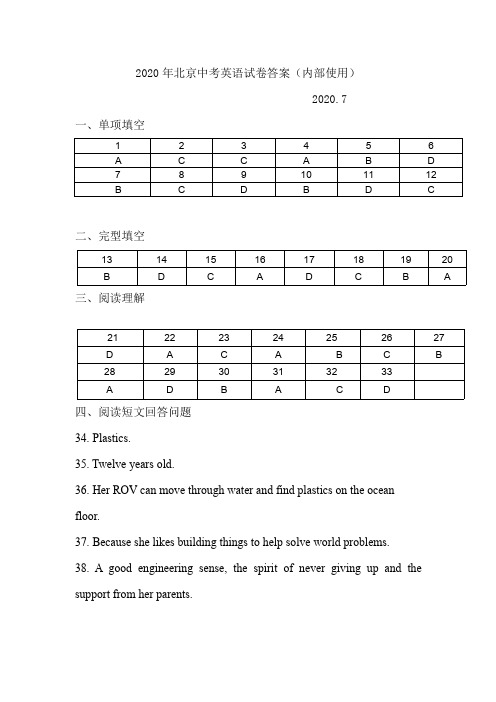
2020年北京中考英语试卷答案(内部使用)2020.7一、单项填空123456A C C AB D789101112B C D B D C二、完型填空1314151617181920B DC AD C B A三、阅读理解21222324252627D A C A B C B282930313233A DB AC D四、阅读短文回答问题34.Plastics.35.Twelve years old.36.Her ROV can move through water and find plastics on the oceanfloor.37.Because she likes building things to help solve world problems.38.A good engineering sense,the spirit of never giving up and the support from her parents.五、文段表达题目①∶【参考范文】Dear Peter:How are you getting on?I'm writing this email to say sorry.I am really grateful that you lent your book to me.In order to give it back to you as soon as possible,I took it to the library yesterday.I also borrowed some other books in the library before I left.However,when I arrived at my dormitory,I couldn't find your book.I searched all my dormitory as well as the road from the dormitory to the library.The next day I also looked for it in each and every corner of the library.To my disappointment,I had no luck.I'm sorry I can't give it back to you on time as I promised before..But I will buy a new one for you.I hope you can accept my apologies.I sincerely beg your pardon again.YoursLi Hua题目②∶【参考范文】Without accumulating,we can hardly achieve anything.Accumulating knowledge plays an important role in my life,which can improve my abilities as well as broaden my vision.In order to accumulate knowledge,I have made great efforts.At school,I tried my best to listen to the teacher carefully and take down the key points in class,which was of great benefit for me to fully absorb the knowledge.In my spare time,I developed the habit of reading.Since it is an excellent way to accumulate knowledge,I have read a lot of world-famous books and the latest English magazines.From accumulating knowledge,I have gained a lot.I become more knowledgeable and have a better understanding of the world.Accumulating knowledge is a useful way to help me make a better preparation for my dream.。
2020北京中考英语卷子及答案
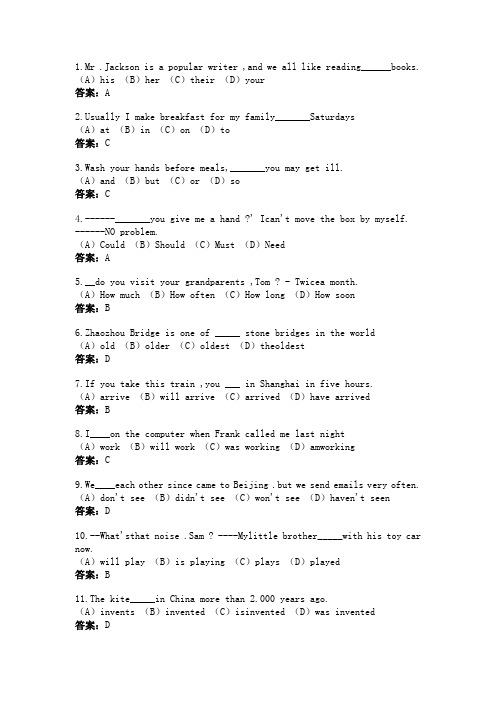
1.Mr .Jackson is a popular writer ,and we all like reading______books. (A)his (B)her (C)their (D)your答案:Aually I make breakfast for my family_______Saturdays(A)at (B)in (C)on (D)to答案:C3.Wash your hands before meals,_______you may get ill.(A)and (B)but (C)or (D)so答案:C4.------_______you give me a hand ?' Ican't move the box by myself. ------NO problem.(A)Could (B)Should (C)Must (D)Need答案:A5.__do you visit your grandparents ,Tom ? - Twicea month.(A)How much (B)How often (C)How long (D)How soon答案:B6.Zhaozhou Bridge is one of _____ stone bridges in the world(A)old (B)older (C)oldest (D)theoldest答案:D7.If you take this train ,you ___ in Shanghai in five hours.(A)arrive (B)will arrive (C)arrived (D)have arrived答案:B8.I____on the computer when Frank called me last night(A)work (B)will work (C)was working (D)amworking答案:C9.We____each other since came to Beijing .but we send emails very often. (A)don't see (B)didn't see (C)won't see (D)haven't seen答案:D10.--What'sthat noise .Sam ? ----Mylittle brother_____with his toy car now.(A)will play (B)is playing (C)plays (D)played答案:B11.The kite_____in China more than 2.000 years ago.(A)invents (B)invented (C)isinvented (D)was invented答案:D12.----Do you know_____? - At 9 :00 tomorrow morning.(A)when the video meeting began (B)when did the video meeting begin (C)when the video meeting will begin (D)when will the video meeting begin答案:C二、完形填空(共8分,每小题1分)阅读下面的短文,掌握其大意,然后从短文后各题所给的A、B、C、D四个选项中,选择最佳选项。
2020北京市中招考试英语真题(解析版)含答案
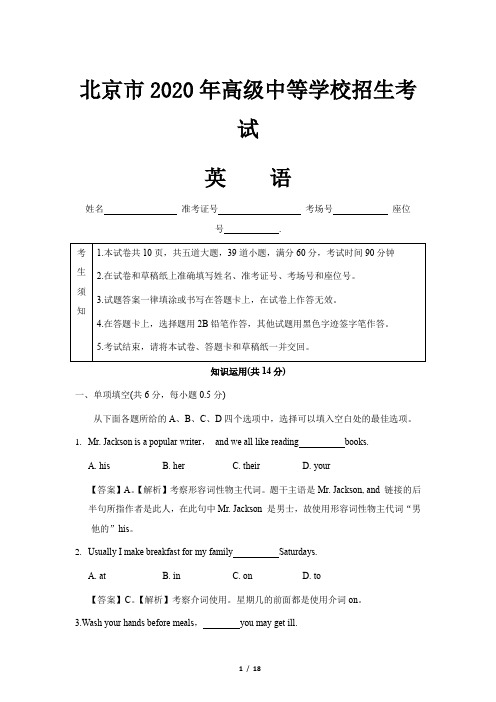
北京市2020年高级中等学校招生考试英语姓名准考证号考场号座位号.知识运用(共14分)一、单项填空(共6分,每小题0.5分)从下面各题所给的A、B、C、D四个选项中,选择可以填入空白处的最佳选项。
1.Mr. Jackson is a popular writer,and we all like reading books.A. hisB. herC. theirD. your【答案】A。
【解析】考察形容词性物主代词。
题干主语是Mr. Jackson, and 链接的后半句所指作者是此人,在此句中Mr. Jackson 是男士,故使用形容词性物主代词“男-他的”his。
ually I make breakfast for my family Saturdays.A. atB. inC. onD. to【答案】C。
【解析】考察介词使用。
星期几的前面都是使用介词on。
3.Wash your hands before meals,you may get ill.A. andB. butC. orD. so【答案】C。
【解析】考察连词使用。
本题前半句是祈使句,句意为:“饭前需洗手”紧接着转折省略了:“如果不洗手”——即否则,四个选项中,只有or表达否则。
4.—you give me a hand? I can't move the box by myself—No problem.A.CouldB. ShouldC. MustD. Need【答案】A。
【解析】考查情态动词。
句意:—你能帮我搭把手吗?我一个人搬不动这个箱子。
—没问题。
该句型为一般疑问句,根据答语No problem可知,应用语气比can更缓合,多作询问帮忙用,常用could来提问。
5.—do you visit your grandparents,Tom?—Twice a month.A.How muchB. How oftenC. How longD. How soon【答案】B。
2020年(北京)中考英语高分策略-专题3-阅读短文回答问题302 邻里+善良日+雕塑
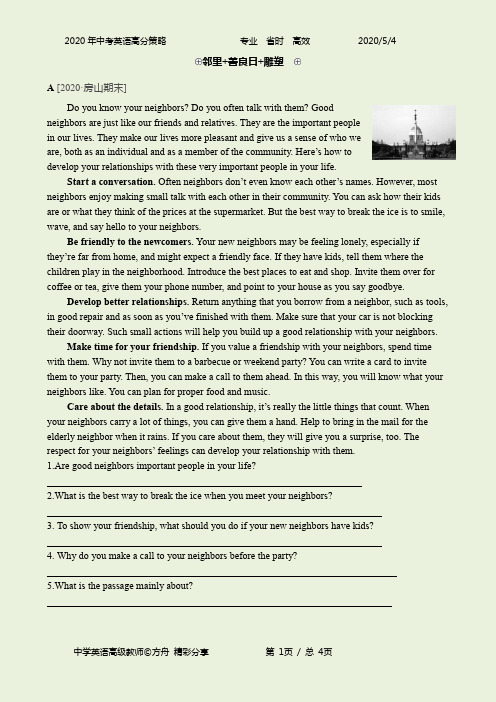
邻里+善良日+雕塑A[2020·房山期末]Do you know your neighbors? Do you often talk with them? Goodneighbors are just like our friends and relatives. They are the important peoplein our lives. They make our lives more pleasant and give us a sense of who weare, both as an individual and as a member of the community. Here’s how todevelop your relationships with these very important people in your life.Start a conversation. Often neighbors don’t even know each other’s names. However, most neighbors enjoy making small talk with each other in their community. You can ask how their kids are or what they think of the prices at the supermarket. But the best way to break the ice is to smile, wave, and say hello to your neighbors.Be friendly to the newcomers. Your new neighbors may be feeling lonely, especially if they’re far from home, and might expect a friendly face. If they have kids, tell them where the children play in the neighborhood. Introduce the best places to eat and shop. Invite them over for coffee or tea, give them your phone number, and point to your house as you say goodbye.Develop better relationships. Return anything that you borrow from a neighbor, such as tools, in good repair and as soon as you’ve finished with them. Make sure that your car is not blocking their doorway. Such small actions will help you build up a good relationship with your neighbors.Make time for your friendship. If you value a friendship with your neighbors, spend time with them. Why not invite them to a barbecue or weekend party? You can write a card to invite them to your party. Then, you can make a call to them ahead. In this way, you will know what your neighbors like. You can plan for proper food and music.Care about the details. In a good relationship, it’s really the little things that count. When your neighbors carry a lot of things, you can give them a hand. Help to bring in the mail for the elderly neighbor when it rains. If you care about them, they will give you a surprise, too. The respect for your neighbors’ feelings can develop your relationship with them.1.Are good neighbors important people in your life?2.What is the best way to break the ice when you meet your neighbors?3. To show your friendship, what should you do if your new neighbors have kids?4. Why do you make a call to your neighbors before the party?5.What is the passage mainly about?World Kindness Day is a celebration which takes place on 13 November each year. It was introduced in 1998 by the World Kindness Movement. It is celebrated in many countries, including Canada, Japan, Australia and some other countries. World Kindness Day is celebrated to highlightacts of kindness passing on the positive(正面的) power.Why be kind? Few people would disagree with the idea that a kind action is good for thesoul(灵魂). It is a win-win situation because it leads to a sense of well-being both for the receiver ofthis kind action, as well as for the person who does the action. As a simple example, let’s imagine you have a workmate who always does a very good job. How about taking a moment to mention this to them, just in conversation or perhaps by email? The effects of this will probably be quite clear: your workmate will be happy to receive some praise and, in addition, you will probably feel good about yourself for having spread a little joy.Many organisations try to encourage people to be kind, wherever and whenever they can. Perhaps the strongest supporters of this idea are the Random Acts of Kindness (RAK) Foundation. The RAK website suggests some ways to show kindness. Generally, these fall into three categories.The first is interpersonal kindness. Some examples are giving old clothes to charity(慈善机构) orwriting a good comment about a restaurant that you like. The second is environmental kindness, which could mean simply recycling or organising a group event to clean a local park or beach. The third category is less obvious: personal kindness, which means treating yourself kindly. Some examples are taking a walk in nature or setting yourself an objective to complain less. The logic is that by being kind to yourself, you will surely be kinder to the world around you.Most experts on kindness agree that it has a sort of ripple effect. This means that one kind action is more likely to lead to more and more. So don’t wait for kindness to find you today, go and start a new ripple!1.When is World Kindness Day?2.Why is World Kindness Day celebrated?3.Why should people be kind?4.According to RAK, what does “personal kindness” mean?5.What does the passage mainly tell us?The Angel of the NorthThe Angel of the North is a modern sculpture (雕塑) in Gateshead, Tyne and Wear, England,designed by Antony Gormley. Completed in 1998, it is a steel sculpture of an angel, 20 metres tall,with wings measuring 54 metres across. The angel, like much of Gormley’s other work, is based on the shape of his own body.According to the artist himself, the Angel of the North symbolises(象征着)the change from the industrial to the information age and stands proudly as abeacon (灯塔) of hope for the future of the region.It cost £800,000 to make, with the money coming from the British government. It took fouryears to make the sculpture. It was made in three parts, the body, which weighed 100 tons, and two wings, which weighed 50 tons each. Angels are usually thought of being white, as they represent light, but Gormley’s Angel of the North is a reddish brown colour. This is because the steel has a special paint to protect it from strong wind.The parts of the angel were moved from Hartlepool to Gateshead at night in big trucks. It took 5 hours to move everything, even though the journey is very short. The Angel of the North was put on the hill in Birtley on the 15th of February, 1998.The sculpture was made in memory of the coal miners who worked hard in the dark earth below the hill to bring wealth to the North East in the 19th and 20th centuries. It is a sign for Gateshead.The sculpture has become one of the most famous landmarks in England that can be seen in television and films. It is the largest sculpture in Britain. Over 150,000 people come to Gateshead to see the sculpture every year.1.Who designed the Angel of the North?2.How long did it take to make the sculpture?3.What is the color of the Angel of the North?4.When was the Angel of the North put on the hill in Birtley?5.Why was the Angel of the North made?【参考答案】A1. Yes./Yes, they are.2. I/We can smile, wave, and say hello.3. Tell them where the children play in the neighborhood.4. Because I/we will know what my/our neighbors like.5.Good relationship with our neighbors is very important and how to develop our/your relationship with our/your neighbors./Why and how to develop our/your relationship with our/your neighbors. B1.It’s on 13 November each year.2.To highlight acts of kindness (passing on the positive power).3.It is good for the soul./It is a win-win situation./It leads to a sense of well-being both for the receiver of this kind action, as well as for the person who does the action.4.Treating yourself kindly.5.What World Kindness Day is and why and how to be kind.C1.Antony Gormley.2.It took four years to make the sculpture.3.Gormley’s Angel of the North is a reddish brown colour.4.The Angel of the North was put on the hill in Birtley on the 15th of February, 1998.5.The sculpture was made in memory of the coal miners (who worked hard in the dark earth below the hill to bring wealth to the North East in the 19th and 20th centuries).。
2020年(北京)中考英语高分策略-专题2-单项选择
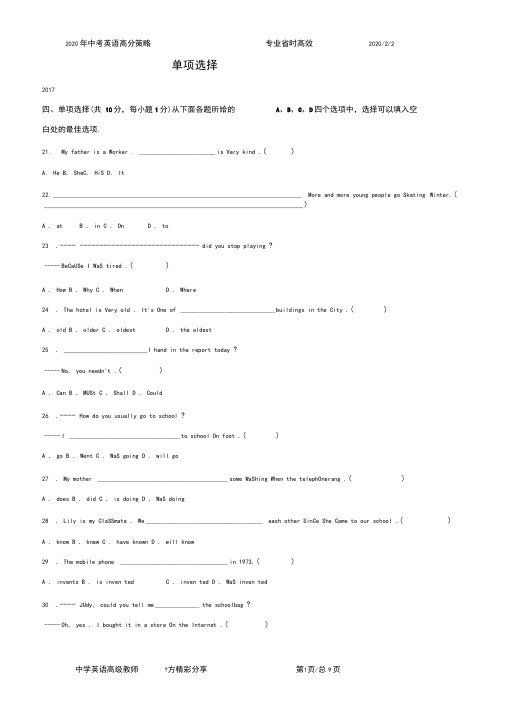
单项选择2017四、单项选择(共10分,每小题1分)从下面各题所给的A、B、C、D四个选项中,选择可以填入空白处的最佳选项.21.My father is a Worker . ________________________ is Very kind .( )A. HeB. SheC. HiSD. It22. ______________________________________________________________________ More and more young people go Skating Winter.( _________________________________________________________________ )A . atB . inC . OnD . to23. ---- ------------------------------ did you stop playing ?----- BeCaUSe I WaS tired .( )A . HowB . WhyC . WhenD . Where24. The hotel is Very old . It's One of ______________________________ buildings in the City .( )A . oldB . olderC . oldestD . the oldest25. _____________________ I hand in the report today ?----- No, you needn't .( )A . CanB . MUStC . ShallD . Could26. ---- How do you usually go to school ?----- I ___________________________________ to school On foot .( )A . goB . WentC . WaS goingD . will go27. My mother _________________________________________ some WaShing When the telephOnerang .( )A . doesB . didC . is doingD . WaS doing28. Lily is my CIaSSmate . We _____________________________________ each other SinCe She Came to our school .( )A . knowB . knewC . have knownD . will know29. The mobile phone __________________________________ in 1973.( )A . inventsB . is inven tedC . inven tedD . WaS inven ted30. ---- JUdy, could you tell me ______________ the schoolbag ?----- Oh, yes . I bought it in a store On the Internet .( )A . Where did you buyB . Where will you buyC . Where you boughtD . Where you will buy 2017四、单项选择(共10分,每小题1分)从下面各题所给的A、B、C、D四个选项中,选择可以填入空白处的最佳选项.21. My father is a Worker . is Very kind .( )A. HeB. SheC. HiSD. It【考点】61:人称代词.【分析】我爸爸是一名工人.他非常善良.【解答】答案:A .考查人称代词.句意:我爸爸是一名工人.他非常善良.根据题干My father is a WOrker . isVery kind .可知My father是男性,空后有is ,所以用he,即我爸爸是一名工人.他非常善良.故选 A .22. More and more young people go Skating Winter .( )A . atB . inC . OnD . to【考点】7B :常用介词的辨析.【分析】越来越多的年轻人在冬天滑冰.【解答】答案:B当表示时间时,at用于具体的时刻前;in用于年、月、季节和泛指的早上、下午、晚上前;On用于日期、星期、具体的早上、下午、晚上前. to用于分钟数和整点间,表示差…分到…点.此处的Winter是季节,选B.23. ------ did you stop playing ?----- BeCaUSe I WaS tired .( )A . HowB . WhyC . WhenD . Where【考点】97:疑问副词.【分析】--你为什么不玩了?--因为我累了.【解答】答案:B.考查疑问副词.句意:--你为什么不玩了?--因为我累了. how怎样,用于询问方式;Why为什么,用于提问原因;When什么时候,提问时间;Where哪里,提问地点.根据回答BeCaUSeI WaS tired .因为我累了.可知问的是原因,所以说你为什么不玩了?用Why .故选B .24. The hotel is Very old . It's One of buildings in the City .( )A . oldB . olderC . oldestD . the oldest【考点】81 :形容词的比较级和最高级.【分析】这家旅馆很旧,是城里最古老的建筑物之一.【解答】答案:D •考查最高级•句意"这家旅馆很旧,是城里最古老的建筑物之一. ".A旧的,形容词原级.B更旧的,比较级.C最高级前通常加the. D最旧的,最高级.结合语境One Of…"…之一",由buildings in the City在城市里的建筑,可知三者以上比较,用最高级the oldest最旧的.选D.25.----- I hand in the report today ?----- No, you needn't.( )A . CanB . MUStC . ShallD . Could【考点】DB :情态动词.【分析】----我必须今天交报告吗?------ 不,没有必要.【解答】答案:B.结合下文No, you need n't和上下文语境可知上文是说我必须上交吗?故用must开头的一般疑问句,故答案是B.26.----- HoW do you usually go to school ?----- I to school On foot .( )A . goB . Went C. WaS going D . will go【考点】F6:时态辨析.【分析】--你通常怎样去上学?我步行去上学.【解答】答案:A .考查时态.句意"--你通常怎样去上学?--我步行去上学. ".A动词原形.B过去时.C过去进行时态.D 一般将来时态.由USUally通常,可知表示习惯性动作用一般现在时态主语是I 我,第一人称,谓语动词用原形go.答案是A .27 . My mother __________________________________________ some WaShing When the telephOnerang.( )A . doesB . didC . is doingD . WaS doing【考点】F6:时态辨析.【分析】电话铃响时,我妈妈正在洗衣服.【解答】答案:D.考查时态.句意"电话铃响时,我妈妈正在洗衣服. ".A第三人称单数.B过去时.C现在进行时态.D过去进行时态.由rang过去式,可知表示过去某个时间正在进行的动作,这里指电话铃响时,我妈妈正在洗衣服,用过去进行时态,结构是was∕were+动词的现在分词.主语是mother单数,用was. do的现在分词是doi ng.答案是D.28. Lily is my CIaSSmate . We each other SinCe She Came to OUr school .( )A . knowB . knew C. have known D. will know【考点】F5:现在完成时.【分析】莉莉是我的同学,自从她来我们学校我们就认识彼此了.【解答】答案:C.结合可知动作发生在过去,对现在造成一定的影响,故用现在完成时have/has+过去分词,主语We .故have ,故答案是 C .29. The mobile phone in 1973.( )A . inventsB . is inven tedC . inven tedD . WaS inven ted【考点】GA :语态的辨析.【分析】手机是1973发明的.【解答】答案:D .考查被动语态.句意"手机是1973发明的.".A第三人称单数.B 一般现在时态的被动语态.C过去时.D 一般过去时态的被动语态.结合语境1973年,可知应该是一般过去时态,因此 A , B不正确.主语mobile phone手机,是动词inVent"发明"动作的承受者,因此用一般过去时态的被动语态,结构是was/were+动词的过去分词,C不正确.答案是 D .30. ----- J Udy, could you tell me _______________ the schoolbag ?----- Oh, yes . I bought it in a store On the Internet .( )A . Where did you buyB . Where will you buyC . Where you boughtD . Where you will buy【考点】K5 :宾语从句.【分析】--朱蒂,你能告诉我你在哪里买的书包吗?哦,是的.我在网上的一家商店买的.【解答】答案:C .根据Could you tell me ________ ?再结合选项,可知could you tell me后面是跟一个宾语从句,宾语从句中应该用陈述语序,即主语+谓语,所以排除AB .再根据I bought it in a store on the Internet .是说我在网上的一家商店买的.可知是一般过去时,排除 D ,故选:C .2018一、单项填空,从下面各题所给的A、B、C、D个选项中,选择可以填入空白处的最佳选项。
2020年北京市中考英语题型专项复习题库:阅读理解(20篇)-精选.doc

Passage 1(2017~2018学年度东城区第一学期期末)Do you have hard rubbish? WM RubbishManagement Service Company collects it twice a year for free from each family. Below are someguidelines about our hard rubbish collectionservice.What can/cannot be collected as hardrubbish:●We collect clothes, floor covering,wooden doors and furniture(家具).●TVs, fridges, building materials, glass, car parts, green waste, paints and chemicals, etc. c an’t be collected.Booking your hard rubbish collection:We have weekly collections of hard rubbish. You can book your collection when it suits you.Call us on 9298 8000 between 8 am and 5 pm Monday to Friday.Putting your hard rubbish out:Make sure you place your hard rubbish out of your house, e.g. in your front yard(院子) before the collection day. If not, you cannot look the collection again. ……………………………………………………………………………If you would like to read more information on hard rubbish collection, you can visit .If you have advice on hard rubbish collection, please contact us on 5518 3555 or visit us at 511 Burwood Highway.1. The company offers free hard rubbish collection service for each family _____.A. once a weekB. twice a yearC. three times a yearD. once a month2. What can be collected as hard rubbish?A. Glass.B. Fridges.C. Clothes.D. Chemicals.3. Before the collection day, you have to _____.A. put at your hard rubbish into a boxB. call 5518 3555 to book the collectionC. put the hard rubbish out of your houseD. fill in the form on the company’s website【主旨大意】本文是一篇说明文,介绍的是某公司的垃圾回收业务,包括回收什么种类的垃圾,怎样联系公司以及把垃圾放在什么地方等信息。
- 1、下载文档前请自行甄别文档内容的完整性,平台不提供额外的编辑、内容补充、找答案等附加服务。
- 2、"仅部分预览"的文档,不可在线预览部分如存在完整性等问题,可反馈申请退款(可完整预览的文档不适用该条件!)。
- 3、如文档侵犯您的权益,请联系客服反馈,我们会尽快为您处理(人工客服工作时间:9:00-18:30)。
亲情+风俗+历史A [2020·门头沟期末]Every year on my birthday, from the time I turned 12, a white gardenia(栀子花) was sent tomy house. No card came with it. Calls to the flower shops were not helpful at all. After a while I stopped trying to discover the sender’s name and was just very pleased with the beautiful white flower in soft pink paper.But I never stopped imagining who the giver might be. Some of my happiest moments were spent daydreaming about the sender. My mother encouraged this imagining. She’d ask me if there was someone for whom I had done a special kindness. Perhaps it was the old man whom I looked after when he was ill. As a girl, I had more fun imagining that it might be a boy.One month before my graduation, my father died. I felt very sad and didn’t want to go to the coming graduation dance at all. And I didn’t care whether I had a new dress or not. But my mother, in her own sadness, would not let me miss any of those things. She wanted her children to feel loved and lovable. In truth, my mother wanted her children to see themselves much like the gardenia—lovely, strong and perfect with perhaps a bit of mystery.My mother died ten days after I got married. I was 22. That was the year the gardenia stopped coming.1. What color was the flowers the writer received?2. How did the writer feel when she daydreamed about the giver?3. Why didn’t the writer want to go to the graduation dance?4. How old was the writer when she got married?5. Who sent the flowers to the writer every year on her birthday?Superstition about SneezingIt’s a Western custom to say “bless you” after someone sneezes.“Achoo!”“Bless you.”This is a common exchange in English-speaking countries. When you hear someone else sneeze, it is polite to say “bless you”, to which they should reply with “thank you”. But where does this odd custom come from?In fact, it dates back to medieval(中世纪的) Europe, specifically, the time of the bubonic plague(黑死病). The plague killed nearly one-third of Europe’s population within three years(1347—1350). The first symptom of the bubonic plague was sneezing. At that time, people believed that if you sneezed, your soul might leave your body.People didn’t know how to cure the bubonic plague. They were simply encouraged to say“God bless you” and do other superstitious(迷信的) things, hoping the soul would go back into thebody. And over time, “God bless you” was shortened to “bless you”.Of course, in modern times, we know that sneezing has nothing to do with the soul or any other superstitious thing. But just like so many other customs from the past, saying “bless you” has stayed with us for hundreds of years.But you may be wondering—what if someone sneezes more than once? Well, you don’t have to keep saying “bless you”. In fact, if someone sneezes more than twice, or sneezes especiallyloudly, you may want to ask them if they’re OK, or if they would like a tissue(纸巾).Then again, you don’t really need to say anything at all. People won’t think you’re rude if you forget to say “bless you”. But they will also appreciate it if you do.1.Where does the odd custom “bless you” come from?2.What was the first symptom of the bubonic plague?3.Did people know how to cure the bubonic plague in the past?4.How long has “bless you” stayed with us?5.What should you do if someone sneezes more than twice?English dictionaries which were written before 18th century had only words which were not common, or words which were difficult to spell. Then, in 1755, Dr. Samuel Johnson, a great English writer, wrote a famous dictionary. This dictionary contained common words as well as unusual ones. It also showed how words should be used in sentences.In 1858, a group of people who study language started to write The Oxford English Dictionary (OED). They wanted to list all the words of the English language. They even included words which were not used any more. They also wrote sentences that show the meanings of words. They also described the history of words, saying when words were first used in English, and which languages they came from. The OED tells us, for example, that “algebra” comes from Arabic and was first used in English in the 16th century. The dictionary took hundreds of people over seventy years to complete. It has been improved many times, as the number of words used in English has increased. The more recent dictionary gives the meanings of over one million words. It is put into twenty-one books: each one is over one thousand pages long.Although Americans speak English, they use some words that are not used in British English, for example, the season an English person calls “autumn”, is called “fall” by an American. The first dictionary of American English was published by Noah Webster in 1828. He also decided to spell some words in a simpler way. For example, he wrote “colour” as “color”, “centre” as “center”, and “plough” as “plow”. These spellings are still used in America today. Since 1828, Webster’s Dictionary of American English has been improved and made bigger many times.A good dictionary is a very important tool for every reader. Many modern English dictionaries are now available. They give different kinds of information. It is very important to choose the best dictionary for your needs and to use it often.1.Who was Dr. Samuel Johnson?2.When did people begin to write the OED?3.How long did the OED take to complete?4.Which word is American English, “plough” or “plow”?5.How is American English different from British English?【参考答案】A1. White.2. She was happy.3. Because her father died.4. 22.5. Her mother.B1.(Medieval) Europe./The time of the bubonic plague.2.Sneezing.3.No./No, they didn’t.4.For hundreds of years.5.We can ask them if they’re OK, or if they would like a tissue.C1.A great English writer.2.In 1858.3.Over seventy years.4.Plow.5.Americans use some words that are not used in British English and spell some words in a simpler way.。
